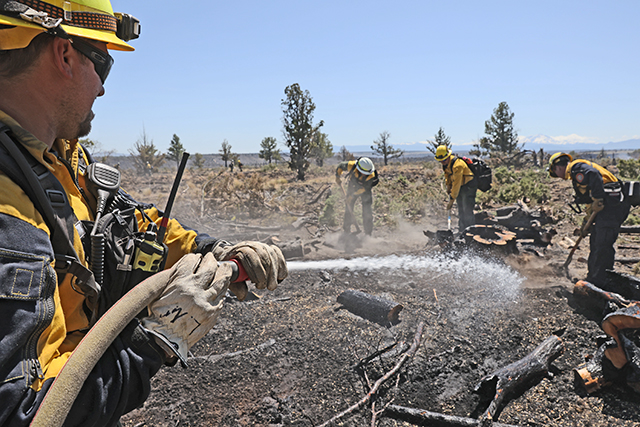Developers eye mobile home parks
Published 5:00 am Sunday, July 28, 2013
Woody Mines didn’t want to fork over much more than $400 a month in rent when he moved to Bend three years ago, shortly after his wife passed away.
A retired grocery store owner from Hermiston, Mines picked a lot in the Century Drive Mobile Home Park, near Southwest Simpson Avenue and Southwest 15th Street.
Then he listened as rumors spread: A developer was looking to buy the 71-lot park, with an eye for pushing the tenants out and replacing them with a mix of apartments and retail buildings. The rumor was true, though the developer ultimately backed out.
But it got park residents talking.
Last week, they took a bold step to put fears of losing their homes to rest. They purchased the mobile home park for themselves, tapping into a state grant and a series of loans to form a mobile home cooperative. A board of directors, made up of park tenants, will set rent rates and help ensure tenants keep up the property.
“There are a lot of low-income people here, who can’t really afford to live somewhere else,” Mines said. “This is the cheapest place around. I checked.”
For people like Mines, the number of places to check in Bend has steadily declined.
Developers bought and leveled five large mobile home parks in the city between 2005 and 2007, envisioning bigger, more expensive homes for Bend’s booming population.
By 2011, each of the five properties had been foreclosed on. Today, all but one of them are bare land. No new mobile home parks have been built since.
“It’s a real problem,” Jim Long, Bend’s affordable housing manager, said of the decline in mobile home parks. Oregon Housing and Community Services lists 20 mobile home parks within the Bend city limits today.
For towns with lower land values and ample affordable housing, fewer mobile homes may not be a problem, Long said.
But Bend hasn’t been one of those communities since the 1990s. The recession gutted land values and cut home prices in half between the height of the bubble and the bottom of the crash. Still, prices have risen steadily for the last year.
And developers have been poking around.
As recently as the start of the year, Century Drive Mobile Home Park nearly joined the list of closed parks with displaced residents.
Brian Fratzke, owner and principal broker of Fratzke Commercial Real Estate, spent the last 18 months trying to sell the mobile home park on behalf of the owner. He got interest from developers throughout the latter part of 2011, all of 2012 and the start of this year.
A Willamette Valley company was looking at clearing out Century Drive Mobile Home Park to build 220 mixed-use apartments and retail shops on the 2-acre site. Ultimately, the company rejected the idea because it couldn’t get city approval for the entire plan before closing the deal, Fratzke said.
State laws passed in 2007, requiring compensation from $5,000 to $9,000 for park tenants displaced by redevelopment, also played a part.
“Redeveloping a mobile home park in Oregon is next to impossible” because of the laws, Fratzke said.
Even with compensation requirements, however, Bend Mayor Jim Clinton sees the ingredients for a repeat of 2004 to 2007. Mobile home parks can be attractive candidates for redevelopment, zoned for residential use and equipped with infrastructure like water and electricity.
“Landowners can make a lot of money when properties are redeveloped,” Clinton said. Just like the boom years, rising land values today “create a huge potential for development.”
The city took its own steps to address the issue last time the market was hot and park tenants were being pushed out.
In 2006, responding to a group of displaced park residents across the city who formed Tenants United for Fairness, the City Council passed an ordinance forcing property owners to pay park tenants the cost of moving their mobile homes, or the fair market cost of the mobile homes. The local law was whittled down following legal challenges and the passage of the state law.
Clinton, who was serving on the council at the time, remembers it as one of the more complex and controversial issues brought up during his tenure, and one that could return to the forefront if land values keep rising.
“It’s a conflict of two sets of property rights,” Clinton said.
The owners of a piece of land can develop it however they want, so long as it meets zoning and other city requirements. But mobile home park tenants, who often own their homes but rarely the land they sit on, have few options if they get evicted, potentially facing homelessness or the prospect of leaving town.
From a city planning perspective, “sometimes we get a little overly focused on single-family (homes) and subdivisions,” Clinton said. “The city shouldn’t lose sight of other types of housing.”
Often, though, Bend has forgotten.
Developers built about 12,000 single-family homes in Bend between 2000 and 2010, according to U.S. Census Bureau figures. Builders added more than 3,500 multifamily units to the city over that time.
But the number of mobile home lots decreased by 300.
As the housing market heats up, contractors start building more expensive homes, said Long, Bend’s affordable housing manager.
A mobile home tenant losing his or her home today would find few alternatives. Of the 2,085 mobile home park spaces in Deschutes County, just 68 are vacant, according to state figures.
Apartment vacancies are scant, and prices are on the rise. The average monthly rent for a two-bedroom Bend apartment is $705, according to a Central Oregon Rental Owners Association survey released earlier this year.
Housing Works, the regional housing authority that issues Section 8 rental vouchers, has 1,800 families on its waiting list, 500 more than the total getting assistance from the agency.
— Reporter: 541-617-7820
eglucklich@bendbulletin.com






